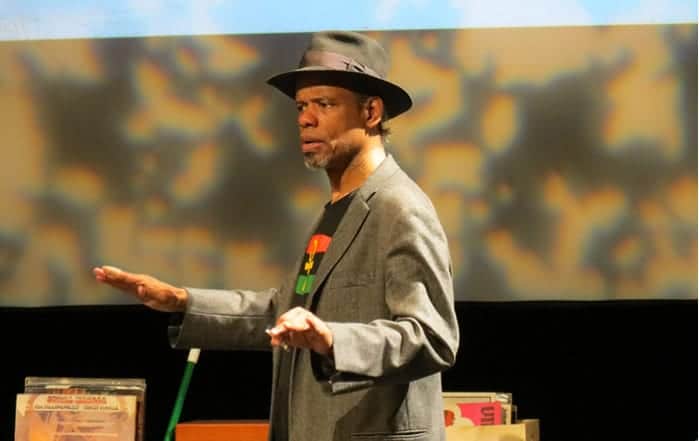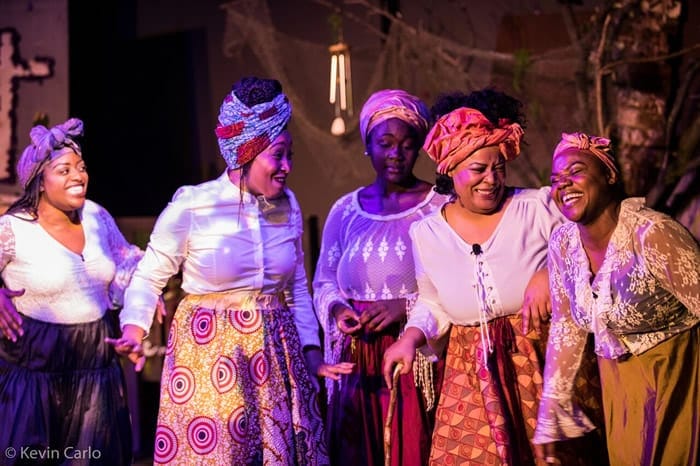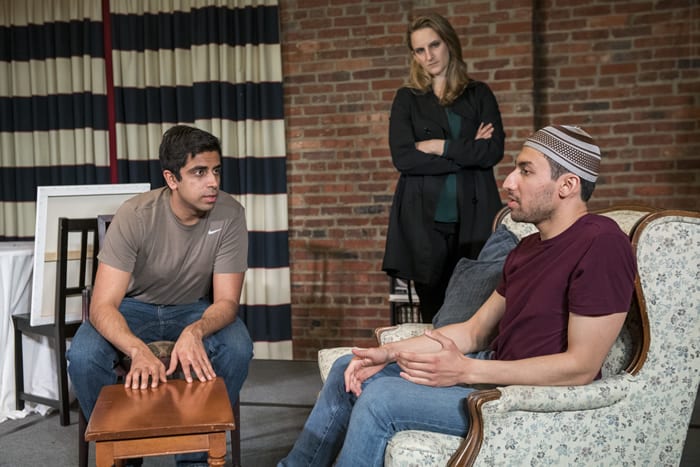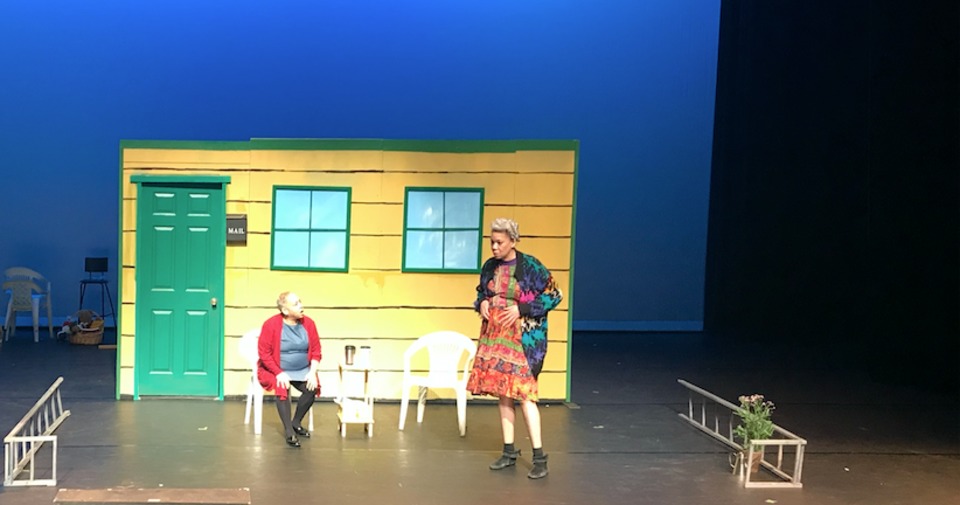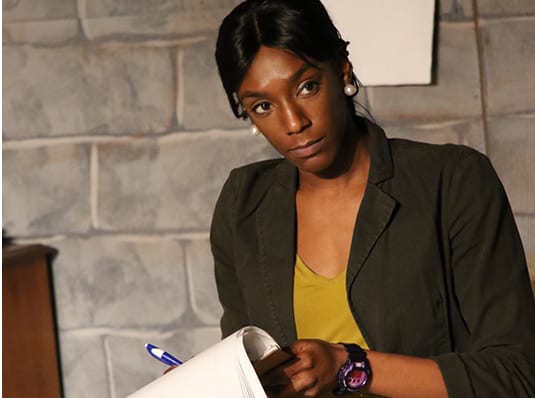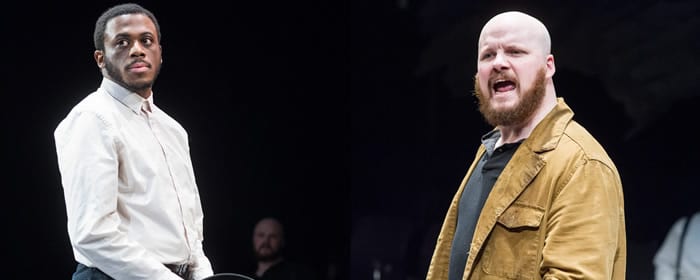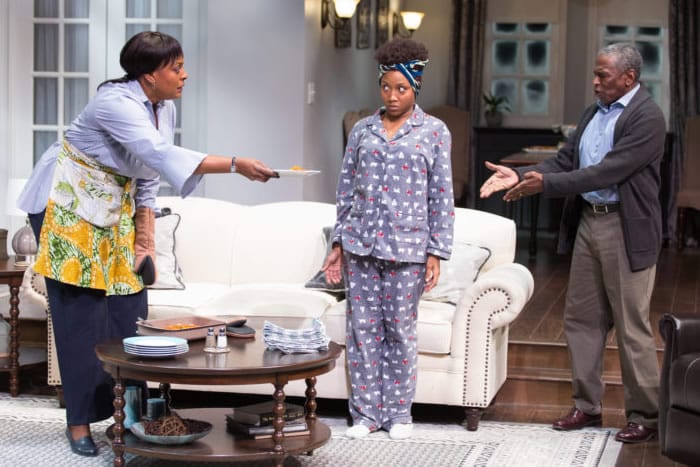by Angela Carroll
This article was first published in DC Theatre Scene.
RS/24 is an ethereal drama about one long night in the life of Herbie, a record store owner (writer and director Clayton LeBouef, the veteran actor is best known for his performances in “Law and Order: Criminal Intent” and “HBO’s The Wire.”)
Audience members, drawn into the small black box theater of the Anacostia Playhouse by a soulful soundtrack, see the space transformed into a vinyl stocked vintage record store with a huge golden record centerstage.
At the start, the play jumps between the present, character memories and excerpts from epic dreams. Memories are presented in disjointed and transient ways that mirror the nonlinear happenings in dreamtime. The dream sequences provide some of the most beautiful and surreal scenes in the play. Short video projections (Tewodross Melchishua Williams) and stylized choreography elicit an interesting illusory aesthetic. Red lights and the crisp sound of an mbira announce the presence of avant-garde jazz musician Sun Ra (Maurice McKinney) and two Arkestra angels (Vaunita Goodman/Larry E. Hull). The three beings are dressed in white. They pose in yogic postures, bow to each other and then address the audience, arms stretched outwards towards us as if welcoming us into the dream. “Words are like birds.” Sun Ra calls. “Words are like birds,” the angels reply. “Songs are like birds. They soar to higher heights” Sun Ra calls.
When John Coltrane’s beloved devotional “A Love Supreme” begins, Sun Ra and the angels disappear, replaced by projected video portraits of legendary deceased Black musicians, superimposed against a bright galaxy filled with a universe of stars. It becomes clear that LeBouef is drawing a connection between ancestral reverence traditions from the African Diaspora and his sacred appreciation for music.
Herbie, now alone in the record store, is unnerved by a dream he had a few hours earlier in which his store was visited by a celestial gathering of venerated musical ancestors including Sun Ra and members from his Arkestra. The musicians issue a directive that Herbie unearth a small box buried under a rose bush in his garden, bring it to his record store and keep the store open for 24 hours. Which is why Herbie is thereat 2am when he hears the loud bang of a gunshot from the alley.
Shortly after, Melody (Kazi Jones) a lady of the night, walks in. At first she focuses on turning Herbie into her latest john, but eventually, and after being paid for her time, warms to Herbie’s company and the temporary haven from the streets he provides her. The lion’s share of the play focuses on their conversations that become more intimate throughout the night – shared recollections about music, Herbie’s dream and the mysterious contents in the box, and Melody’s disclosures about her life and profession. Jones and LeBouf are touching and relatable. The play gives them memorable one-liners from famous song lyrics. At times this inclusion is an endearing nod to great musicians, and in other moments it feels more like a forced cliché, but still largely engaging. On opening night, performers persevered through a few awkward missed sound and performance cues, but overall offered an entertaining work.
Nostalgic and magical, RS24 is a worthwhile play that explores the power of dreams, the wonder of great music and messages that transcend death.
————–
RS/24. Writer, director, actor Clayton LeBouef. Featuring Kazi Jones, Vaunita Goodman, Maurice McKinney, Larry E. Hull. Projection and Sound Design: Tewodross Melchishua Williams. Lighting Designer: John D. Alexander. Stage Manager: Kristina Jackson. Producer/co-director: Ella Davis and Cheryl Lewis Hawkins, All About the Drama Theatre Group, Prosperity Media Enterprise and The Zhanra Group .

